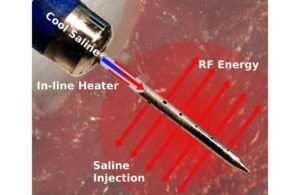
Thermedical announced today that it received FDA approval for a clinical trial to evaluate its SERF ablation system.
Waltham, Massachusetts-based Thermedical will conduct an open-label, single-arm interventional clinical trial to evaluate the safety and efficacy of the Thermedical SERF ablation system with the Durablate catheter in people with ventricular tachycardia (VT) resistant to conventional treatment.
Thermedical designed the SERF ablation system with the Durablate catheter to treat patients with ventricular arrhythmias resistant to antiarrhythmic drugs or standard ablation procedures. The current treatment for VT comes in the form of implantable cardiac defibrillators (ICDs). VT patients with ICDs who experience VT episodes may be treated with conventional radiofrequency ablation.
According to a news release, the system provides a new form of biological heat transfer that it designed to be more efficient than conventional ablation methods, with the Durablate catheter designed for delivering energy with a high level of accuracy to better control the ablation size and treat tissue deeper in the heart wall where life-threatening arrhythmias that cause VT are often located.
“We are grateful to the FDA for the rapid approval of this pivotal trial to evaluate our Saline Enhanced Radiofrequency (SERF) Ablation System in patients who have run out of treatment options for their VT episodes and who suffer from extremely poor quality of life,” Thermedical co-founder and CEO Michael Curley said in the release. “In our recent multi-center trial, 31 of 32 participants experienced immediate elimination of their clinical VT at the end of the procedure, and therapies such as shock or pace regulation were reduced by 89% during the five-month follow-up in these patients.”
Mayo Clinic (Rochester, Minnesota) will be the first of as many as 25 investigational sites in North America to enroll patients in the larger clinical trial, with cardiac electrophysiologist Dr. Douglas Packer set to be the principal investigator.
Additional sites are planned for Birmingham, Alabama, Boston, Charleston, South Carolina, Montreal, Nashville, Tennessee, Philadelphia and Quebec City. The trial will enroll 154 participants with recurrent, sustained, monomorphic VT that is resistant to drug therapy and conventional catheter ablation.
Participants will have a SERF ablation procedure with follow-up at seven days, one month, three months and six months.
“This larger clinical trial is very important to further the evaluation of this innovative approach to treating problematic VT to reduce or eliminate shocks that implantable cardioverter defibrillators deliver to this patient population,” Curley said. “We are encouraged by the early data and are eager to further demonstrate the safety and efficacy of our promising new SERF technology.
“Furthermore, SERF offers hope to people who suffer from this condition, as it could be life-changing for the treatment of refractory VT.”